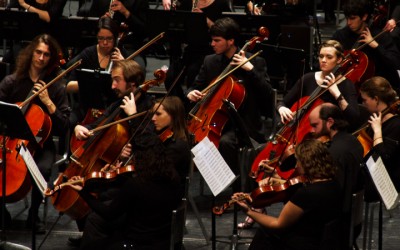Musicology Colloquium
Thursday March 12, 2020
2:00-3:30pm
CFA 2100
This talk explores the relationship between trauma and identity by examining Arab music performance on the U.S.–Mexico border. Drawing on the musicking of Syrian and Mexican migrant communities, I interrogate theories of cultural and psychological trauma and borderland epistemologies to explore how border tensions influence the often-fraught views of identity.
Dr. Andrea Shaheen Espinosa is Associate Professor of Ethnomusicology and Oboe at the University of Texas, El Paso, and currently serves as the Musicology Area Coordinator for the Department of Music. She is the founder and director of the UTEP’s internationally recognized Middle Eastern music ensemble, Layali Al-Sham. She is a Fulbright Fellow, a FLAS recipient, and a Medici Scholar, and is currently serving as the UTEP College of Liberal Arts Dean’s Faculty Fellow. Her research focuses on music, migration, and trauma, and her recent publications include articles in The Double Reed, Cahiers d’ethnomusicologie, and Yearbook for Traditional Music.
Pulitzer winning alumnus Raven Chacon to debut new composition, perform
Pulitzer winning alumnus Raven Chacon to debut new composition, perform Tickets available for performances in Santa Fe, Albuquerque By Mary Beth King August 11, 2022 Pulitzer Prize winning Diné composer and sound artist Raven Chacon, who earned his Bachelor of Arts...
The American Prize in Vocal Performance—Women in Art Song and Oratorio, 2022 Winner
The American Prize National Nonprofit Competitions in the Performing Arts, David (Volosin) Katz, founder and chief judge, is honored to announce the winners, runners-up, and honorable mentions of The American Prize in Vocal Performance—women in art song and oratorio,...
UNMSO and UNM Choirs Present: A Concert For Healing
Friday, May 5 at 7:30 pmPopejoy HallUNM Symphony Orchestra directed by Dr. Matthew Forte.UNM Choirs directed by Dr. David Edmonds The UNM Choirs and Symphony Orchestra present a concert that speaks directly to the challenges faced by musicians during the COVID-19...



